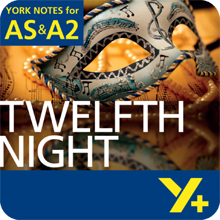Examiner's Notes
You assessed this answer as a D grade.
Hover over the highlighted text to read the examiner’s comments. These are linked to the Assessment Objectives, which are listed in the side panel.
The whole play is centred around a moment of chance, which is of Viola being shipwrecked – and ending up in Illyria, and her twin brother – who seems dead – also ending up on the island, this leads to lots of comic confusions and romantic outcomes. From the start, ‘chance’ is mentioned – ‘It is perchance that you yourself were saved’ says the Captain which might make us think – ‘saved for what?’ In a way this is similar to the start of “The Tempest” because although the storm is created by Prospero it is luck that has meant his enemies are in a ship nearby. Often, shipwrecks or journeys are metaphors for chance or Fate in Shakespeare, but here they are literal.
It is interesting that wanting to believe in chance seems very important too. When the Captain says that he saw Viola’s brother struggling to stay alive she says, ‘For saying so, there’s gold.’ It is as if she feels she can ‘buy’ good luck.
But the idea of Fate and chance are a bit difficult to understand because you could say that Viola takes things into her own hands by deciding to serve Orsino – she makes her own luck, but even she is aware that she is not totally in control of things: ‘I’ll serve this duke …’ she says at first (Act I Scene 3) but then later says, ‘What else may hap, to time I will commit …’ which means she will see how things turn out. I think this is an important idea because the fun of the play is when you don’t know what is going to happen, like who might appear or disappear and why.
On a plot level, chance is very important. For the comedy to work, it is vital that Sir Andrew comes across Sebastian before Viola realises her brother is alive. Otherwise we could not have the bit in Act IV Scene 1 when Sir Andrew realises Cesario/Sebastian is far tougher than he expected! In fact, Sebastian’s actions mirror his sister’s in more ways than one. The idea of chance and Fate gets linked into the idea of Illyria as a mad world, as we can see from the place’s name. Otherwise how are we meant to accept that Sebastian very quickly accepts the idea of marrying Olivia? He decides that a world that doesn’t make sense is better than one that does – ‘If it be thus to dream, still let me sleep!’ (Act IV Scene 1) He gives himself up to Fate and chance.
It is important to mention that Fate and chance were seen in a different way in Shakespeare’s day. People were coming out of the Medieval time and the idea of the ‘Great Chain of Being’, which meant you stuck to your place in the world but by Shakespeare’s time people were beginning to think you could change things yourself. It could be said that in “Twelfth Night” Shakespeare is exploring this idea – like how Malvolio tries to be more than a servant but is punished for it.
In the end, Fate and chance are explored in the play because they have a big role dramatically. The audience have to accept the coincidences as without them there would be no play. In fact, all Shakespeare’s plays feature fate and chance but in this one it mostly leads to fortune not disaster.
